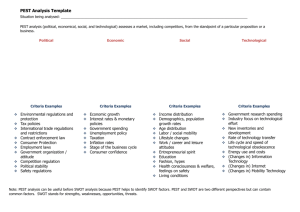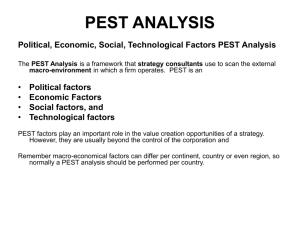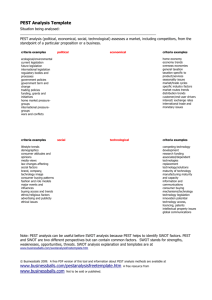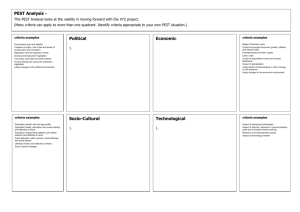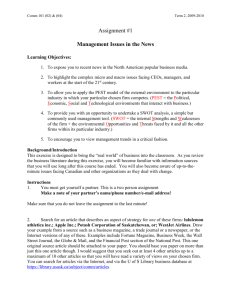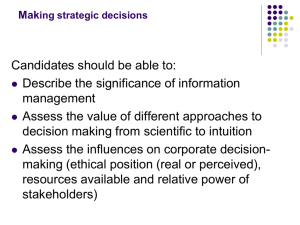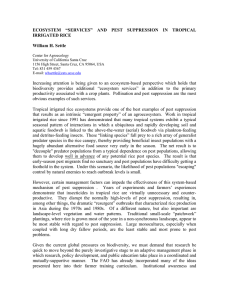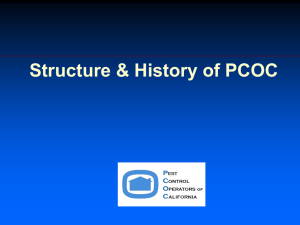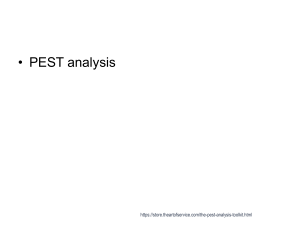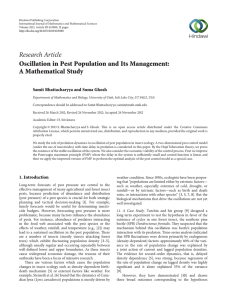marketing Plan
advertisement
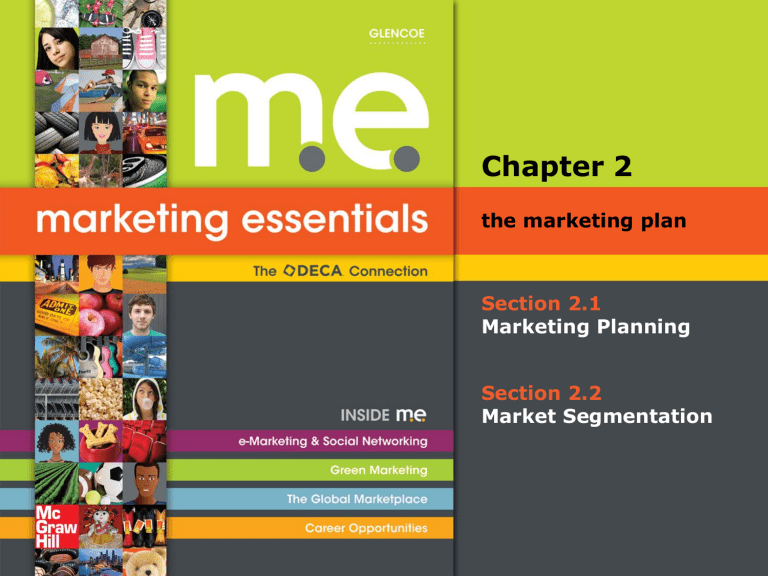
Chapter 2 the marketing plan Section 2.1 Marketing Planning Section 2.2 Market Segmentation Section 2.1 Marketing Planning PEST Analysis Political Four Factors of a PEST Analysis Economic Socio-Cultural PEST analysis Scanning of outside influences on an organization. Technological Section 2.1 Marketing Planning PEST Analysis Political Issues Economic Issues Government affects business operations • Recession • Unemployment • Currency Rates • Import Pricing • Trade Restrictions Socio-Cultural Factors Changes in attitudes, lifestyles, and opinions provide opportunities and threats Technology Companies must embrace technology and innovate to stay competitive Section 2.1 Marketing Planning PEST Analysis Economic Factors Section 2.1 Marketing Planning PEST Analysis Economic Factors Section 2.1 Marketing Planning Writing a Marketing Plan Marketers create a marketing plan to communicate aspects such as: Analysis and Research marketing Plan Goals Objectives Strategies A formal written document that directs a company’s activities for a specific period of time. Section 2.1 Marketing Planning Writing a Marketing Plan Executive Summary Situation Analysis Elements of a Marketing Plan Objectives Marketing Strategies executive summary A brief overview of the entire marketing plan. situation analysis The study of the internal and external factors that affect marketing strategies Implementation marketing strategies Evaluation and Control Strategy that identifies target markets and sets marketing mix choices that focus on those markets Section 2.1 Marketing Planning Writing a Marketing Plan Single-Minded Specific Useful Objectives Measurable Time Framed Section 2.1 Marketing Planning Writing a Marketing Plan Marketing Plan Objectives Section 2.1 Marketing Planning Writing a Marketing Plan Marketing Plan Objectives Section 2.1 Marketing Planning Writing a Marketing Plan A superior distribution system The quality of the product Key Point Differences A more competitive pricing structure A more creative ad campaign Section 2.1 Marketing Planning Writing a Marketing Plan Implementation Schedule of activities Job assignments Sales forecasts Budgets Details of each activity Who is responsible for each activity sales forecasts The projection of probable, future sales in units or dollars. Section 2.1 Marketing Planning Writing a Marketing Plan Performance standards help assess Marketing Objectives performance standard Financial Objectives Marketing Mix Strategies An expectation for performance that reflects the plan’s objectives. Section 2.1 Marketing Planning Writing a Marketing Plan Section 2.1 Marketing Planning Writing a Marketing Plan Section 2.1 Marketing Planning Section 2.1 1. Explain the four aspects of a SWOT analysis and tell how it fits into a marketing plan. Four aspects of a SWOT analysis: • internal strengths • weaknesses • external opportunities • threats The results of a SWOT analysis are reported in the situational analysis of a marketing plan. Section 2.1 Marketing Planning Section 2.1 2. List the four areas that are investigated in PEST analysis and explain why the knowledge gained can be valuable to a company. External threats and opportunities include • competition • environmental scan of political issues • economic factors • socio-cultural factors • technological changes An accurate analysis of those factors helps a company prepare for threats such as competition or a changing marketplace. Section 2.1 Marketing Planning Section 2.1 3. Describe how the marketing mix relates to the implementation of a marketing plan. The marketing process keeps going through three phases: • planning • implementation • control The marketing audit at the end of the process evaluates a company’s marketing objectives, strategies, budgets, organization, and performance. It identifies problem areas in marketing operations. A marketing audit is done on a formal basis once a year and on an informal basis continuously.

